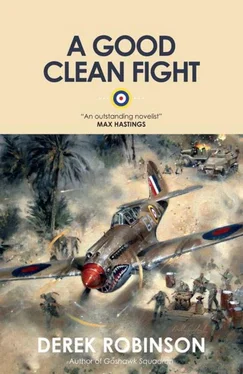“Here!” Barton tossed the rifle to him. The conversation made him uncomfortable. He watched Hooper work the bolt and take aim. “Anyway, they bloody well started it,” Barton said. “I had a cousin killed in the London blitz. Never met her, but I saw a photograph. Pretty little girl and they blew her to bits.” He blinked as Hooper fired. “They’re all shits as far as I’m concerned. They don’t know the meaning of humanity and decency and fair play. I shan’t be sorry if every German gets his stupid fucking head blown off.”
“Well, you’ve certainly done more than your share,” Hooper said.
“It’s the only way we’ll ever get back to a normal civilized kind of living,” Barton said, “by ripping their German arms off and beating their German brains in with the bloody German stumps. Blokes like Skull can’t understand that. They’re too busy filling their fountain pens. Are you going to fire that thing or fondle it all day?” Hooper put three shots through the RAF roundel.
* * *
A lot of the Sahara was once seabed. You can pick up fossilized fish bones five hundred miles inland. This is one reason why so much of Libya and Egypt is so flat. Although Defa airstrip was nearly two hundred miles from the Mediterranean it was only three hundred feet above sea-level, and the Heinkel 111 flew south for another couple of hundred miles before the desert floor climbed to twice that height. It was a very gradual, unexciting geography: one beige brown after another. Paul Schramm soon grew tired of it.
With di Marco sitting beside the pilot, the only place left in the cockpit was the bomb-aimer’s position, lying face-down in the Perspex nose. Schramm tried it for a while, dozed off, and woke up when the sun began to bake him. He squeezed past the pilot and sidled along the catwalk in the middle of the bomb-bay, to the space where the air-gunners usually lived. There was nothing to look at there, but there was nothing to look at anywhere.
He sat propped against a bulkhead and tried to make sense of his situation. He was a more or less superfluous passenger in a smallish, oldish, twin-engined bomber designed to raid targets a few hundred kilometers away which was trying to reach a target that was two thousand kilometers from its base. Below, for almost the entire flight, was a desert that was so lethal you might as well shoot yourself and get it over with. Assuming, of course, you survived a forced landing in a machine so overloaded with fuel that it was a flying tanker. Schramm found himself listening to the throb of the engine-roar, frightening himself with imagined hiccups or hesitations. That was absurd. The whole damned operation was absurd. He made himself reread the newspaper and he fell asleep.
Di Marco shook him awake. “We are crossing the border between Libya and Chad,” he said.
Schramm looked out of a window. Brown desert stretched to the horizon. “Should I care?” he asked.
“Now look out the other side.”
Schramm did, and saw mountains that climbed like cathedral spires. They were dangerously, suicidally close. The peaks were several thousand feet above the Heinkel: he had a sick feeling that a breeze could blow the aircraft against those sheer sides at any moment. Then he took a breath and looked harder. The mountains were a mile away.
Di Marco suggested he sit in the cockpit. The view was even more stupendous from there: everything was bigger, clearer, more jagged, more magnificent. Schramm looked at the map and identified the Tibesti Mountains. They reared out of the desert like a gesture of defiance, pushing up and up, until the empty wasteland of sand was left a huge and giddy distance below.
The pilot let him enjoy the view. When it was behind them he said, “My backside’s numb. You take her for a bit. We’re halfway. She’s trimmed to fly hands-off. Just sit here and look confident. Steer one-nine-five and don’t touch any of the knobs.”
* * *
The man with the stomach wound was Walters. They buried him in the scrub. The ground was hard, so his grave was just a scrape in the soil with a lot of rocks heaped on top. “Rest in peace,” Lampard said, and that was enough. Nobody was in a mood for funeral rites. The faint noise of German military vehicles kept their nerves on edge; and occasionally the crash of mortar shells reached them from some distant and futile attempt at flushing out.
Lampard itched to get on and get out. They had thirty-odd miles to go. He disliked this wadi: it was too broad, too shallow; there was nowhere to put look-outs; the scrub was so thin that a shufti-kite would spot the jeeps; he felt exposed. But they could not move. Davis’s jeep had a puncture. What’s more, all the spare tires were holed. It would be madness to go on when a wheel couldn’t be changed in a hurry. Reluctantly, Lampard agreed.
“Time for some grub, too,” Davis suggested. Lampard agreed to that. Hunger didn’t add to efficiency. Everyone had bully, biscuit and water. The men examined the jeeps as they ate, and found damage caused either by the racketing drive across the Jebel or the attacks by the CR42s; it didn’t really matter which. Springs had cracked or snapped, a jerrican of petrol was bullet-holed, the steering on Lampard’s jeep was buckled, Davis’s jeep was trickling oil. It could all be patched, but patching took time. Lampard watched them work.
“In case I haven’t said it,” he said, “I want you to know that we put on an absolutely brilliant show last night.”
Nobody replied, perhaps because everyone was still eating, perhaps not. Lampard went away and cleaned his tommy-gun.
At last Davis came and told him the jeeps were as ready as they ever would be.
“Good. These blasted flies are all over me.”
“Wog flies,” Davis said. “Not English. Don’t know how to queue.”
The branches got thrown off the jeeps and the engines were started. They had traveled perhaps fifty yards when a shufti-kite came dribbling over the skyline and they had to swerve under cover again.
It was a Fieseler Storch, as slow as a bicycle. They sat motionless while it made lazy S-bends, all down the valley. “Now go away and bother someone else,” Lampard said. Instead it circled. Five minutes later it was still circling. “What’s it found?” he wondered. “What’s so important?”
Davis volunteered to go and see. While they discussed this, the Storch flew away. “Still worth a recce,” Davis said. “You never know what’s waiting down there. NAAFI van, panzer division, herd of elephants, could be anything.”
Lampard sent him, on foot, with one other man. Half an hour later the man returned. “It’s a bloody great German wireless truck,” he said. “Big radio mast. Sarnt Davis thinks the shufti-kite was reporting to it. He reckons the krauts in the truck are in charge of the search.”
“Take me to him,” Lampard said.
They found Davis hiding in the collapsed stonework of an old well.
“We could destroy that thing in ten seconds,” Lampard said, “but then the Hun would turn up and destroy us in five minutes.”
They had to wait for two roasting, fly-tormented hours until the truck dismounted its aerial and drove off. “My God, this war can be boring,” Lampard grumbled.
* * *
Every time they started up Barton’s Kittyhawk it fired for ten seconds and died. Dirty petrol. They washed the carburettors and cleaned the fuel lines but still the airplane would not come alive. They would have to drain the tanks, filter the petrol and start again.
Barton got fed up with potting at the wrecked Hurricane and he went in search of scorpions to shoot, turning over stones with his boot while he held the rifle ready. He found none and gave up. He noticed a butterfly. It was a Painted Lady, the only sort of butterfly the squadron saw in the desert, a delicate little creature whose wings were mottled a pale buff and red. Presumably it was migrating across the Sahara, a task so huge it was scarcely credible. Barton chased it and tried to shoot it down. He ran a hundred yards and exhausted his ammunition before he gave up, cursing. The Painted Lady fluttered south. It looked good for another thousand miles.
Читать дальше












